"The Wonder of You" is a song written by Baker Knight. It was originally recorded by Vince Edwards in 1958, but this recording has never been released. In an interview with a DJ from Chattanooga, Tennessee, Ray Peterson told the story of how Baker Knight confided that "The Wonder of You" was originally written as a gospel song.

"Way Down" is a song recorded by Elvis Presley. Recorded in October 1976, it was his last single released before his death on August 16, 1977. The song was written by Layng Martine Jr. and recorded by Presley at his home studio in Graceland on 29 October 1976.

"Promised Land" is a song lyric written by Chuck Berry to the melody of "Wabash Cannonball", an American folk song. The song was first recorded in this version by Berry in 1964 for his album St. Louis to Liverpool. Released in December 1964, it was Berry's fourth single issued following his prison term for a Mann Act conviction. The record peaked at #41 in the Billboard charts on January 16, 1965.

"Can't Help Falling in Love" is a song recorded by American singer and actor Elvis Presley for his fourth soundtrack album, Blue Hawaii (1961). It was written by Hugo Peretti, Luigi Creatore, and George David Weiss and published by Gladys Music, Inc. The melody is based on "Plaisir d'amour", a popular French love song composed in 1784 by Jean-Paul-Égide Martini. The song was initially written from the perspective of a woman as "Can't Help Falling in Love with Him", which explains the first and third line ending on "in" and "sin" rather than words rhyming with "you".

"You Don't Know Me" is a song written by Eddy Arnold and Cindy Walker in 1955. "You Don't Know Me" was first recorded by Arnold that year and released as a single on April 21, 1956, on RCA Victor. The best-selling version of the song is by Ray Charles, who took it to number 2 on the Billboard Hot 100 chart in 1962, after releasing the song on his number 1 album Modern Sounds in Country and Western Music. The first version of the song to make the Billboard charts was by Jerry Vale in 1956, peaking at number 14 on the pop chart. Arnold's version charted two months later, released as an RCA Victor single, 47–6502, backed with "The Rockin' Mockin' Bird", which reached number 10 on the Billboard country chart. Cash Box magazine, which combined all best-selling versions at one position, included a version by Carmen McRae that never appeared in the Billboard Top 100 Sides listing.
"Love Letters" is a 1945 popular song with lyrics by Edward Heyman and music by Victor Young. The song appeared, without lyrics, in the film of the same name released in October 1945. A vocal version by Dick Haymes, arranged and conducted by Young, was recorded in March 1945 and peaked in popularity in September. "Love Letters" was subsequently nominated for the Academy Award for Best Original Song in 1945, but lost to "It Might as Well Be Spring" from State Fair.
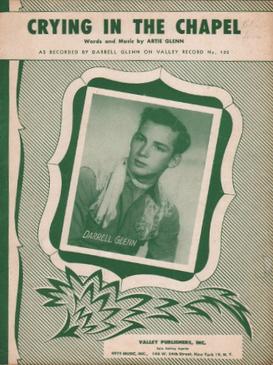
"Crying in the Chapel" is a song written by Artie Glenn and recorded by his son Darrell Glenn. The song was released in 1953 and reached number six on the Billboard chart.

"Can't Smile Without You" is a song written by Christian Arnold, David Martin and Geoff Morrow, and recorded by various artists including Barry Manilow and the Carpenters. It was first recorded and released by David Martin as a solo single in 1975. The version recorded by Manilow in 1977 and released in 1978 is the most well-known.

"If I Can Dream" is a song made famous by Elvis Presley, written by Walter Earl Brown for the singer and notable for its similarities with Martin Luther King Jr.'s 1963 "I Have a Dream" speech. The song was published by Elvis Presley's music publishing company Gladys Music. It was recorded by Presley in June 1968, just two months after King's assassination, and also a short time after Robert Kennedy's assassination. The recording was first released to the public as the finale of Presley's '68 Comeback Special.
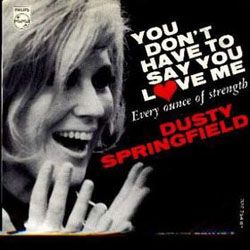
"You Don't Have to Say You Love Me" is a 1966 hit recorded by English singer Dusty Springfield that proved to be her most successful single, reaching number one on the UK Singles Chart and number four on the Billboard Hot 100. It is the cover of a 1965 Italian song by Pino Donaggio and Vito Pallavicini, titled "Io che non vivo (senza te)". Elvis Presley recorded another cover version in 1970 which was a hit in both the US and the UK. Other covers have charted in the UK, Ireland, Italy and Finland.
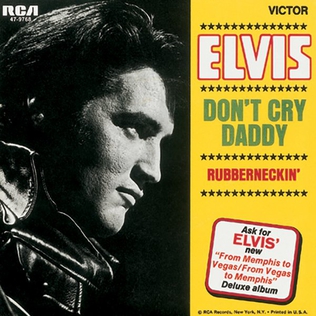
"Don't Cry Daddy" is a 1969 song recorded by Elvis Presley written by Mac Davis. The song was paired with "Rubberneckin'" and both peaked at number six in the United States Billboard Hot 100 chart in January 1970.
"Make Believe It's Your First Time" is a song written by Bob Morrison and Johnny Wilson. Originally recorded by Bobby Vinton, the song was twice recorded by Karen Carpenter, both as a solo act and as a member of the Carpenters.
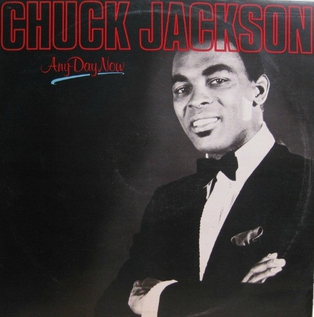
"Any Day Now" is a popular song written by Burt Bacharach and Bob Hilliard in 1962. It has been recorded by numerous artists over the years, including notable versions by Chuck Jackson in 1962, Alan Price in 1965, Elvis Presley in 1969, Scott Walker in 1973 and Ronnie Milsap in 1982. In the lyrics, the singer predicts the imminent demise of a romantic relationship and describes the sadness this will leave.
"My Boy" is a popular song from the early 1970s. The music was composed by Jean-Pierre Bourtayre and Claude François, and the lyrics were translated from the original version "Parce que je t'aime, mon enfant" into English by Phil Coulter and Bill Martin.
"The Tip of My Fingers", also titled "The Tips of My Fingers", is a song written and originally recorded by American country music singer Bill Anderson. First included on his 1962 album Bill Anderson Sings Country Heart Songs, the song was a Top Ten country single for him in 1960.

"I've Lost You" is a song written by Alan Blaikley and Ken Howard for Iain Matthews. It was originally recorded in 1969 and released on Matthews' first solo album after leaving Fairport Convention: Matthews' Southern Comfort.

The singles discography of Elvis Presley began in 1954 with the release of his first commercial single, "That's All Right". Following his regional success with Sun Records, Presley was signed to RCA Victor on November 20, 1955. Presley's first single with RCA, "Heartbreak Hotel", was a worldwide hit, reaching the No. 1 position in four countries and the top 10 in many other countries. Other hit singles from the 1950s include "Don't Be Cruel", "Hound Dog", "Love Me Tender", "Too Much", "All Shook Up", "(Let Me Be Your) Teddy Bear", "Jailhouse Rock", "Don't", "Hard Headed Woman" and "A Big Hunk o' Love". On March 24, 1958, Presley entered the United States Army at Memphis, Tennessee, and was stationed in Germany. He left active duty on March 5, 1960.
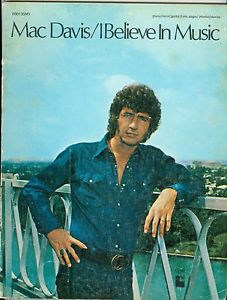
"I Believe in Music" is a 1970 song written and recorded by Mac Davis and later included on his second album I Believe in Music. Gallery covered it in 1972 as the second of three singles off their Nice to Be with You album and the follow-up release to their title track.

"I Can't Help It (If I'm Still in Love with You)" is a song written and originally recorded by Hank Williams on MGM Records. It hit number two on the Billboard country singles chart in 1951. In his autobiography, George Jones printed the first six lines of the song and stated, "Its lyrics couldn't be more simple - or profound."

"Don't Throw It All Away" is a song written by British musician Gary Benson and first released by the Shadows on their 1975 album Specs Appeal. Benson released his version as a single later the same year, which reached number 20 on the UK Singles Chart in the fall of 1975.
















